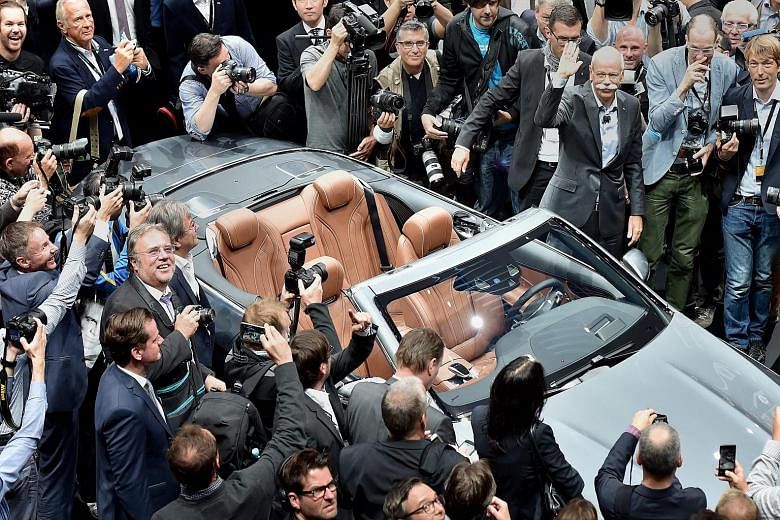FRANKFURT • Whether or not Apple's secretive car project ever leads to an actual automobile, the technology company has already had a profound effect on the vehicle business.
The mere knowledge that Apple has a team of several hundred people working on car designs changed the conversation this week at the Frankfurt International Motor Show.
Along with Google, Apple has focused the minds of vehicle executives on the challenge posed by new technologies that have the potential to disrupt traditional vehicle industry hierarchies.
This year, "connectivity" has supplanted "horsepower" or "torque" as the prevailing
buzzword in Frankfurt. The talk is of self-driving cars, battery-powered cars, and information technology designed to link cars with data networks to make driving safer and more efficient.
Even though neither Apple nor Google is close to mass-producing a vehicle, nervousness about their intentions - which remain cloaked in mystery - is understandable.
As cars increasingly become rolling software platforms, Apple and Google have depths of tech expertise that carmakers would have trouble duplicating. And the Silicon Valley companies have financial resources that dwarf those of even behemoths like Daimler and Volkswagen.
Google, which began working on self-driving cars in 2009, is valued by the stock market at more than five times the worth of either of those car makers. Apple is worth eight times as much. That gives them an advantage in a business that needs huge investment in research and development.
The main risk for carmakers is probably not so much that an Apple car would destroy Mercedes-Benz or BMW the way the iPhone gutted Nokia, the Finnish company that was once the world's largest maker of mobile phones. Rather, the risk is that Apple and Google would turn carmakers into mere hardware makers - and hog the profit.
Carmakers say they are determined to resist that danger by maintaining control of the software proliferating in vehicles.
"What is important for us is that the brain of the car, the operating system, is not iOS or Android or someone else but it's our brain," Mr Dieter Zetsche, chief executive of Daimler, the maker of Mercedes vehicles, told reporters at the car show. iOS is Apple's operating system for mobile devices.
"We do not plan to become the Foxconn of Apple," Mr Zetsche said, referring to the Chinese company that manufactures iPhones.
Even without competition from Apple and Google, carmakers are under extreme pressure to change the way they build cars.
Regulators in Europe and the United States are demanding that cars emit less carbon dioxide, a culprit in global warming. The only way vehicle makers can meet increasingly stringent emissions standards is by selling more hybrid vehicles, and eventually all-electric cars. Both technologies require more software than petrol or diesel engines.
Volkswagen, which was previously regarded as a laggard in vehicle electrification, said in Frankfurt that it would introduce 20 new plug-in hybrid or all-electric models by 2020, and it introduced a battery-powered Porsche concept car.
Mr Martin Winterkorn, Volkswagen's chief executive, spoke of cars that would park themselves and eventually run completely on auto-pilot.
"By the end of this decade, we will have transformed all of our new cars into smartphones on wheels," he said.
While Apple and Google pose a threat to traditional vehicle makers, the mood in Frankfurt is not gloomy. Not long ago, analysts were predicting that the industry faced long-term decline. Surveys showed that younger people were less interested than their parents in cars and driving.
But if Apple and Google are interested in the industry, vehicle executives reason, cars and driving must be cool again. "It's confirmation that we are working in a future industry," said Mr Ola Kaellenius, head of marketing and sales for Mercedes-Benz cars.
Apple and Google have given the car industry a jolt. Now the question is whether carmakers can respond quickly enough.
NEW YORK TIMES

